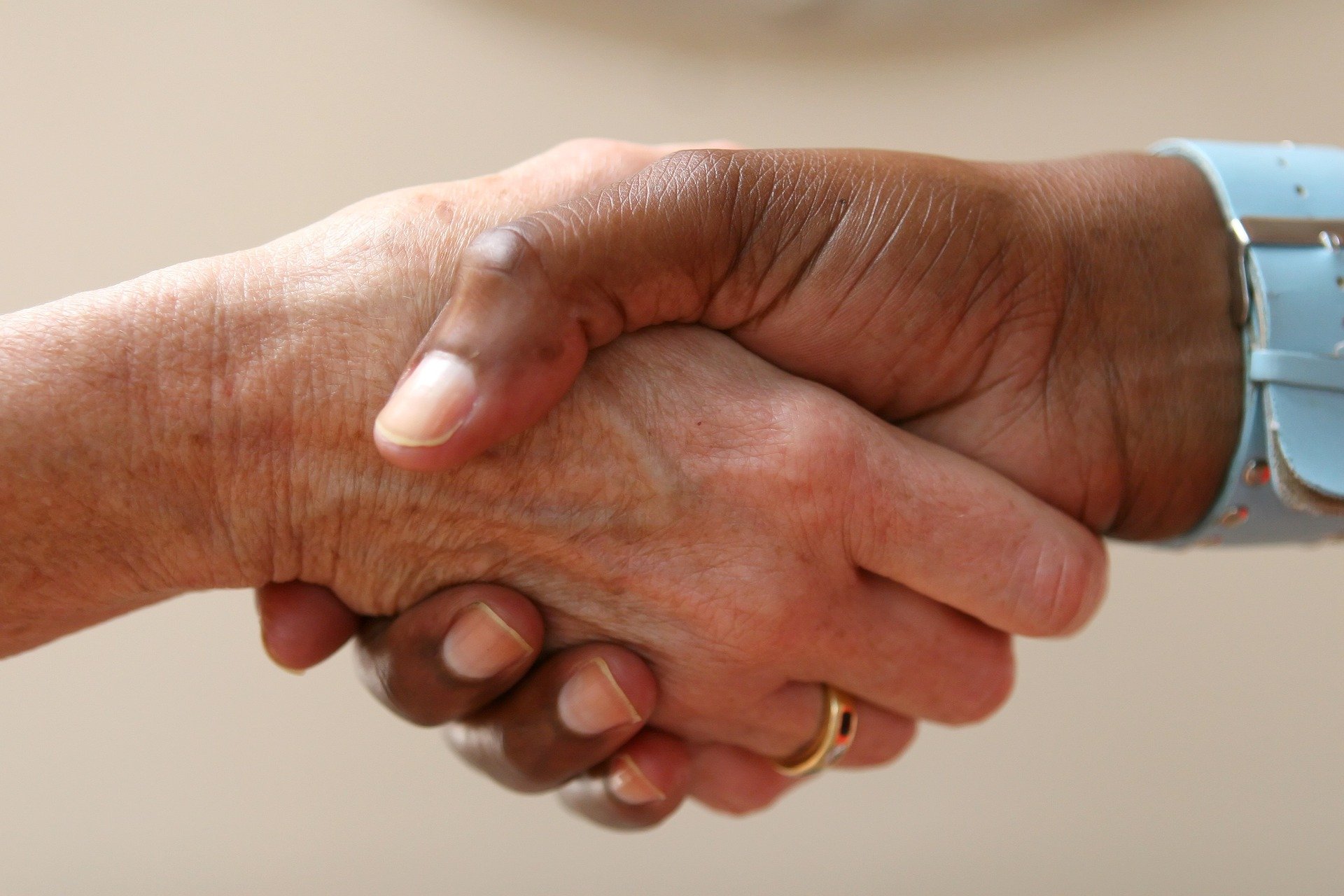Making a great first impression can profoundly influence our lives. Maybe there’s a new job, or a potential relationship at stake. Whatever may hang in the balance, be ready to make a strong impression every time with this advice.
View in gallery
Why First Impressions Matter
Whether or not we care to admit to it, people are judgmental. Within the first few moments of meeting someone new, that judgment occurs. Knowing these snap judgments exist can lead to anxieties about the impressions we make.
You may have a lot riding on those precious moments in time. Initial introductions can lead us to determine a number of traits about someone we’re only just meeting:
- Are they trustworthy?
- Do they care about punctuality?
- Are they empathetic to other people?
Related Reading: How to Make Friends as an Adult
How To Make a Good First Impression
The list goes on. It might seem superficial, but it’s hardwired into our psyche. Luckily, we know just how important a great first impression can be and there are several ways to help you make a positive one.
Be Punctual
It’s important to be punctual, because when you’re late to an event or meeting, it makes the person you’re meeting with feel as though you don’t care. If you’re late for a job interview, the person interviewing you might see this as a red flag and assume you’ll always be late to work. Issues with punctuality can damage your personal life with friends as well. You don’t want the first impression you make to be that you don’t respect someone else’s time.
Being late is also stressful. Trying to get somewhere after running late will show on your face and in your actions. Maybe you won’t have time to eat breakfast or drink your morning coffee. Forgetting to eat or caffeinate can result in brain fog and irritability. You might feel pressure to drive more recklessly or work up a sweat running to make it to your destination. Moreover, when you’re running late you’re risking poor preparedness. In your mad dash for the door you might grab the wrong items or forget to bring them entirely.
You can make being on time a priority by…
- Being prepared! Lay out your clothes and any supplies you need for the next day. Put everything in one place so you won’t forget.
- Setting the timer to keep you moving.
- Planning to arrive early. You can try to avoid mishaps by giving yourself a larger window of time to work with.
- Reminding yourself why you need to be on time. This will motivate you to keep your focus on the tasks at hand.
Of course, accidents happen, and we all make mistakes. If being late is unavoidable, demonstrate to that person you do care about their time and efforts by calling and notifying them of your ETA. This can possibly give you a second chance to make a first impression.
Handshakes
View in gallery
Historically, handshakes have been a way to display trust; shaking someone’s hand was a way to show you weren’t carrying weapons. It was a sign of equal footing.
Handshakes still hold similar power today. Shaking hands allows for the expression of specific personality types. Powerful, assertive people are thought to display a strong grip when shaking hands. A limp handshake, or dead fish handshake, exudes weakness and appears to lack confidence.
What Makes a Good Handshake?
Make sure you look the person you’re meeting in the eyes when shaking their hand. Glancing around the room can seem suspicious or give them the impression you have other prospects in sight.
Avoid gripping a hand too tightly. You don’t want to hurt someone you’re meeting for the first time. Just enough pressure to make solid contact and rid your grip of limpness. Somewhere in the middle is best.
You don’t want to shake hands for too long, eitherf! Timing is crucial. If you let someone’s hand go too quickly it can appear as if you don’t value the interaction and shaking their hand for too long is just obnoxious.
Smile and Speak Clearly
Your facial expression will tell someone a lot about you. Smiling shows that you’re excited and happy to be there. Your smile is a way to display trust and lets someone know you’re focusing on them in that moment. Try to be natural though. Forcing a constant smile can make someone feel uncomfortable and also appears fake.
You should show confidence in yourself and what you’re there to say by speaking clearly. A whisper or mumble can give someone the impression you’re insecure or cause miscommunication. You don’t want to waste time during these crucial moments by having someone ask what you just said every couple seconds.
Conversely, a booming voice is also undesirable. Practically shouting at someone the first time you meet is jarring. You should be mindful of your volume to avoid any inappropriate decibel levels.
Dress Appropriately
We’re forming first impressions from the moment we lay eyes on someone. The concept of not judging a book by its cover is difficult to live by. In fact, certain situations demand the employment of instantaneous judgment. From job interviews, to first dates, what we wear is going to dictate our future.
Showing up to a first date in a t-shirt with stains and sweatpants is a great way to say you don’t care about being there. If they can expect such a display on the first date, then what kind of horrors are they in for once you’re comfortable with them? Be yourself but look put-together while doing so.
For job interviews, you’ll want to stick to the old cliché – dress for the job you want! You wouldn’t wear jeans to interview at a law firm. If the company wants business attire, you wear business attire. Business casual? Throw on a pair of slacks and a button-up shirt. Construct a well thought-out look to show you’ve invested time and consideration into the encounter.
Be Conscious of the Setting
When it comes to first impressions, be aware of where you are. The way you act and the energy you give off will directly influence another person’s thoughts about you.
Refrain from making inappropriate jokes and comments. If you’re meeting someone for the first time, you don’t want to give them the idea you’re crass or rude. The jokes we might tell our close friends and family are not the same ones we should tell a stranger.
Imagine it’s the first time you’re meeting the parents of someone you’ve been dating. You want to gain their trust and respect. Being brash or cracking a crude joke could potentially lead them to believe you’re not the right match for their child. Let them set the tone to determine the types of conversations and commentary that is appropriate. If you give respect, it will be more likely to loop back to you.
Plan Talking Points and Ask Questions
View in gallery
Plan and rehearse possible talking points before your first interaction. Essentially, you’ll want to do your homework ahead of the encounter; you’ll be able to settle any anxieties you may have about the interaction and will see more confident. Having a plan of action will keep you on topic as well.
Practice potential responses to questions they might ask you. This way you’ll be more likely to handle any curveballs they throw at you.
You should also be asking questions. In an interview setting, you aren’t the only person that’s part of the interview. You’re also interviewing them. Find out more about the work culture and what they expect from you by asking them directly. If you’re posing specific, relevant questions about a company, it shows you’ve taken the time to research and have genuine interest in the position.
Asking questions will show you care. You aren’t just cruising through yet another interview or date on autopilot. You’re engaging with the other person and are now showing an interest in them. You’ll be able to learn more about someone you’re meeting if you’re the one asking questions. There should be a mutual give-and-take. Loop the conversation back towards them, don’t allow it to be only one person doing the work.
You can even try something fun like suggesting the 21 questions game to break the ice.
Focus on the Situation
When you’re meeting someone new you should be cognizant of the situation at hand. Daydreaming while another person is trying to talk not only displays apathy, but it is also disrespectful.
Focus on having positive body language. Body language is a powerful communication tool. We hardly notice how much we get from another person’s body language because the impression is made so quickly.
So, when you walk into a room, do it with confidence. There’s more to appearing confident than just having a smile on or offering a firm handshake. You’ll want to stand tall with good posture and make eye contact.
Slouching looks as if the body is drawing into itself, similar to the fetal position. It makes someone appear weak and doubtful. You’ll want to appear full of self-assurance, not self-doubt. Holding yourself upright in a “power pose” will lead you to feel confident along with radiating it.
You will also want to avoid any nervous habits you may have such as biting your nails or holding your hand in front of your face. In fact, placing objects between you and another person or crossing your arms in front of yourself distances you and the other person you’re meeting with.
Can We Change a First Impression?
We always remember our firsts and a first impression is a lasting one, but that doesn’t mean you’re stuck with whatever your end result is. People are very adaptable, and second chances do exist.
You might have a second chance to make a great first impression or possibly mess up a good first impression with a bad second meeting. So, if you feel like your first encounter was horrific, reach out about a follow-up. The worst they can do is say no, and it’s possible you already think they’ve given you a “no.” Reaching out will show your commitment, either to the person, job, or to improving yourself.
If you want to solidify a positive first impression, you should continue to be punctual, dress for the part, and plan ahead. Don’t just fall to pieces once you feel like it’s in the bag. Continue to be the best version of yourself and you’ll be more likely to avoid being someone’s regret.
Final Thoughts on First Impressions
A few seconds is all it takes for someone to develop an impression of you. There’s so much important information to gather and so much can rely on those few seconds. However, if you take these tips into consideration you’ll be one step closer to making a lasting positive impression.
Let us know if any of these tips work for you! If you have any additional advice to give that isn’t present in the article, tell us in the comments.





